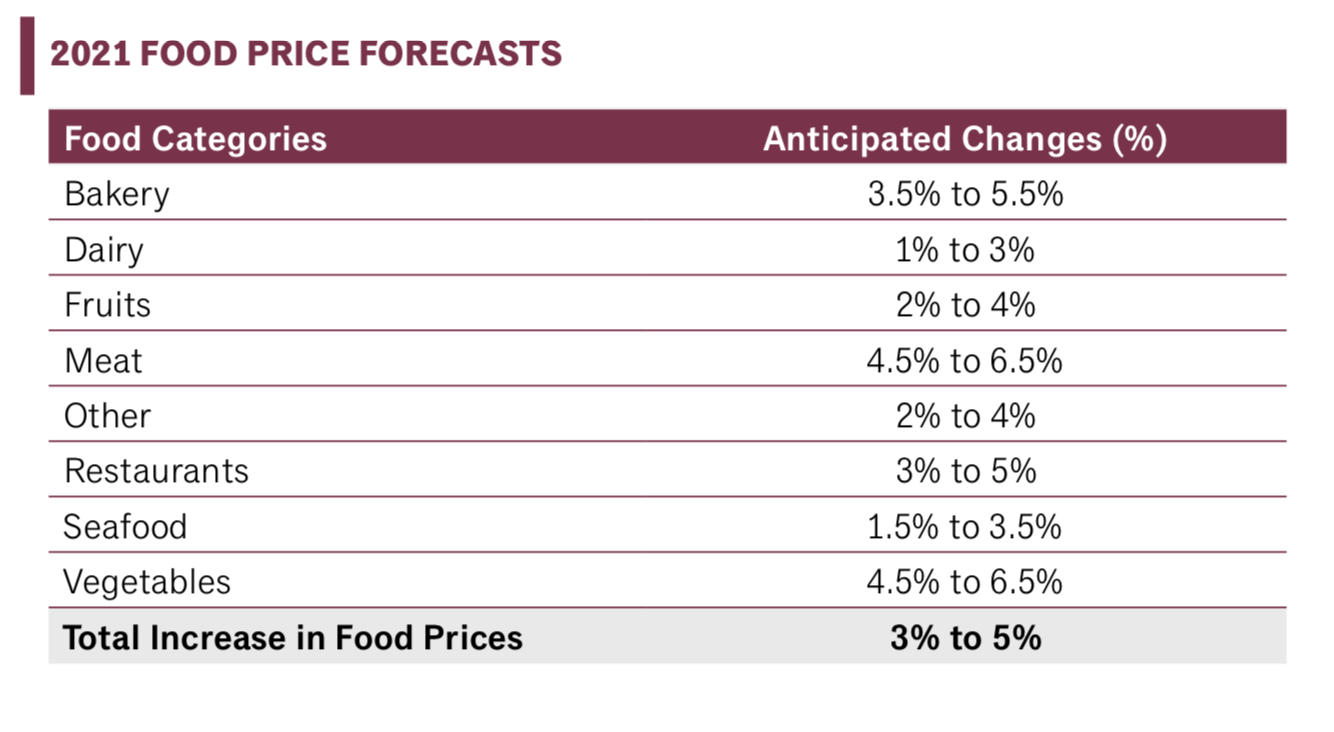At a time when many Canadian households could use a financial break, COVID-19’s ripple effects are expected to add further strain in the coming year in the form of rising food prices.
Canada’s Food Price Report 2021, led by researchers at Dalhousie with support from colleagues at the University of Guelph, the University of Saskatchewan and the University of British Columbia, predicts an overall food price increase of 3 to 5 percent for the year as COVID-19 alters consumer behaviour and affects food prices in “surprising ways.”
“Families with less means will be significantly challenged in 2021, and many will be left behind,” says Sylvain Charlebois, project lead and director of the Agri-Food Analytics Lab at Dalhousie.
 The most significant price increases predicted in the report, released Tuesday, are for meat (4.5 to 6.5 per cent), bakery (3.5 to 5.5 per cent), and vegetables (4.5 to 6.5 per cent).
The most significant price increases predicted in the report, released Tuesday, are for meat (4.5 to 6.5 per cent), bakery (3.5 to 5.5 per cent), and vegetables (4.5 to 6.5 per cent).
“Immunity to higher food prices requires more cooking, more discipline and more research,” says Dr. Charlebois. “It’s as simple as that.”
What’s behind rising prices?
The report places much of the blame for rising food pricing on the pandemic, which has led to border and facility closures, modifications in production, manufacturing, distribution and retailing practices to enhance safety, and shifting consumer demand and unemployment.
Unsettled oil markets and a weakened Canadian dollar are also cited as key factors.
Download the report: English, French
This year’s report — the 11th annual — was produced by long-time research partners at Dalhousie's Agri-Food Analytics Lab and the University of Guelph along with new partners at USask and UBC, making the influential forecast a cross-country collaboration for the first time.
“This year’s report is more robust than ever, with national expertise and collaborations between economists and data scientists strengthening the accuracy and interpretation of price forecasts and reflecting the regional differences in the Canadian food system,” says a release promoting the report.
It also features researchers from a cross-section of Dalhousie facultes, including the Faculty of Arts and Social Sciences, the Faculty of Computer Science and the Faculty of Agriculture.
Rather than calculating average food expenditure for an “average” Canadian family as in past years, the 2021 report instead drills down into expenditures by individual consumers based on demographics — allowing it to better account for the diversity of Canadian families.
One example based on a family that includes a woman (age 31-50), man (age 31-50), a boy (age 14-18) and a girl (age 9-13) predicts annual food expenditure be $13,907 in 2021. That’s an increase of up to $695, or 5 per cent, compared to 2020.
Looking back, looking ahead
In last year’s report, an average Canadian family was forecast to spend up to $12,668 on food during 2020. That amount is likely to be closer to $12,508 when adjusted for inflation given that people ate restaurants less often throughout the year due to the pandemic.
When it comes to 2021, COVID-19 is expected to continue to have an impact on prices. Other factors to watch for, according to the 2021 report, include:
• the effects of climate change,
• the growth in e-commerce and online services,
• the continued loss of the food manufacturing sector,
• the national ban on some single-use plastics
• the impact of the U.S. presidential election on food policy and the Canadian dollar.
For more information, please read the complete Canada’s Food Price Report 2021.
Comments
comments powered by Disqus

